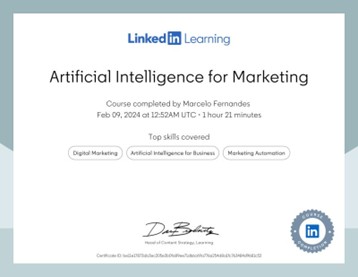Will Artificial Intelligence Replace B2B Marketers? Understand the Benefits, Risks and How to Prepare for the Revolution
Artificial Intelligence (AI) is transforming B2B marketing in ways many marketers never imagined. From automating repetitive tasks to personalizing at scale, AI offers incredible opportunities to increase efficiency and improve the customer experience. Desde a automação de tarefas repetitivas até a personalização em escala, a IA oferece oportunidades incríveis de aumentar a eficiência e melhorar a experiência do cliente.
MARKETING


Artificial Intelligence (AI) is transforming B2B marketing in ways many marketers never imagined.
From automating repetitive tasks to personalizing at scale, AI offers incredible opportunities to increase efficiency and improve the customer experience.
But will it replace marketers or, on the contrary, help them become more strategic and creative? This is one of the biggest dilemmas of our time.
In this article, we’ll explore how AI is impacting B2B marketing, demystifying its benefits and risks, and offering a balanced view of how marketers can prepare for this revolution.
What is Artificial Intelligence already changing in B2B marketing?
1. Automation of Repetitive Tasks and Efficient Processes
One of the main contributions of AI to B2B marketing is the automation of repetitive processes.
Automation tools allow professionals to leave aside tasks such as lead segmentation, sending mass emails and data analysis, gaining more time to focus on strategic activities.
This doesn’t mean that AI replaces professionals, but rather that it frees them to focus on what really matters: creating innovative marketing strategies.
2. Personalization at Scale: Creating Relevant Customer Experiences
AI enables B2B companies to offer personalization at a scale never before seen. By analyzing behavioral data, AI tools can understand the wants and needs of each lead, creating hyper-personalized campaigns that increase the chances of conversion.
This improves the customer experience, but also requires constant adaptation to new market demands.
3. Data Analysis and Decisions Based on Rapid Insights
The volume of data generated by B2B marketing campaigns can be overwhelming, but AI makes it possible to analyze large amounts of information in real time, transforming it into useful insights to optimize campaigns and make rapid decisions.
This not only improves marketing efficiency, but also allows for continuous adjustments based on hard data rather than guesswork.
4. Chatbots and Automated Service
Another common application of AI in B2B marketing is the use of chatbots for customer service. These bots are capable of interacting with leads and customers in an automated way, qualifying them, answering frequently asked questions, and even scheduling meetings for the sales team.
This improves the customer experience and frees up marketing and sales professionals for more complex tasks.


Unquestionable Benefits of AI in B2B Marketing
1. Efficiency and Productivity
Automating repetitive processes frees up time for marketers to focus on more strategic tasks. This not only increases productivity but also reduces human error, optimizing campaign results.
2. Large-Scale Personalization
AI enables much deeper personalization of interactions with leads and customers. AI tools can create highly relevant and targeted content, increasing conversion rates and campaign engagement.
3. Access to Deep Data and Quick Insights
AI transforms data into actionable insights, enabling faster, more accurate decisions. In a competitive market, being able to quickly adjust your marketing strategy is a huge advantage.
But Will AI Replace Marketing Professionals?
While the benefits are clear, B2B marketers are naturally concerned about the impact of AI on their roles. The question is: will AI actually replace marketers or just change their role? The answer lies in a delicate balance.
Risks and Challenges of AI in B2B Marketing
1. Loss of Creativity and Human Intuition
AI is excellent at automating processes and analyzing large volumes of data, but something essential is still missing: human creativity.
Intuition and the ability to generate innovative ideas are human qualities that machines cannot yet replicate. Therefore, AI can increase efficiency, but human creativity remains a differentiating factor.
2. Challenges in Integrating Systems and Data
Many B2B companies already use legacy systems, and integrating new AI tools with these platforms can be a technical challenge. Without proper integration, the use of AI can create more problems than it solves.
3. Ethical and Privacy Issues
The collection and use of personal data through AI raises ethical and privacy issues.
As data protection laws like GDPR become more stringent, businesses need to ensure they are complying with all regulations and respecting consumer privacy.
4. Resistance to Change and Lack of Training
Many marketers may feel intimidated by the adoption of AI or even fear that their jobs will be threatened.
Cultural change within organizations and ongoing training are essential to ensure that staff can take advantage of new technologies without losing the value of human work.
Conclusion: How Can B2B Marketers Future-Proof with AI?
Artificial Intelligence is not a threat to marketing professionals, but a powerful tool that can enhance their skills and boost campaign results.
However, its implementation must be done with caution, balancing the advantages of automation with the need for human creativity and intuition.
Main points to consider:
AI does not replace, but rather augments human capabilities. Marketers can focus on creative strategies while AI takes care of the repetitive tasks.
Continuous training is essential. Professionals must be ready to learn how to work with AI tools so they don’t get left behind.
Be mindful of ethics and privacy. Ensuring that customer data is used transparently and in compliance with regulations is crucial.
AI should be an ally, not a replacement. Creativity and human experience continue to be the differentiators in B2B marketing.
In a scenario where AI is shaping B2B marketing, professionals who know how to integrate new technologies with their human expertise will be the most successful.
The real revolution is not about machines replacing people, but about people using machines to achieve extraordinary results.
See more articles
Featured Articles
Continue reading about B2B marketing


